- Home
- Barry Unsworth
The Songs of the Kings: A Novel Page 25
The Songs of the Kings: A Novel Read online
Page 25
“Naturally, in her presence . . .” The Singer lowered his head as if talking to himself.
“What are you talking about? What is all this mystery?”
There was a short pause while the Singer seemed to ruminate. Then he said, “I do not tell things that are outside of the Songs, or I would not last long as a Singer, not here at least, and probably not anywhere. Calchas the priest would be the one to ask.”
“Calchas? I know him. I saw him sometimes at Mycenae. He is the King’s diviner.”
“Not any longer. He has one task only now.”
“What is that?”
“He will tell you. Calchas has become talkative, he speaks to anyone who will listen, telling his wrongs. Poimenos will show you the way.”
2.
Inside the tent Iphigeneia was silent for a while, not quite looking at her companion, not quite looking at her surroundings, as if still waiting for something more, something to save her from the burden of being alone here, dressed for a different sort of reception.
Sisipyla felt the loneliness of her mistress, seeing her stand there motionless and lost in her bridal clothes. She remembered how she had dressed the princess in the improvised enclosure on the ship, and how docile the usually impatient Iphigeneia had been, raising her arms, turning her body this way and that, offering her face for the makeup, eager for everything to be just so, wanting to make a splendid impression. Now, if Achilles did not come soon, these beautiful things would have to be taken off again, the rouge sponged away, the hair released from its elaborate dressing, the nightgown put on. But it occurred to her now that this couldn’t be done yet, the chest with their things in it had not been brought up from the ship.
“I know these hangings,” Iphigeneia said suddenly. “They are from the walls of the royal apartments at Mycenae. That design of foliage and doves, it’s been there as long as I can remember.” She was smiling and a faint flush of color had come to her face. “My father brought them for tent hangings to use during the siege of Troy, then when he was getting things ready for my arrival he had them hung here, something familiar so I wouldn’t feel too far from home. Even with all these affairs of state in his mind, all that responsibility resting on his shoulders, he found time to think of his daughter’s welfare.”
“He is truly great,” Sisipyla said, glad that the princess had broken the silence, as it meant that now she could speak herself and perhaps be of some comfort to her mistress. She thought of Agamemnon, for whom she had never felt anything but a sort of dread, picturing his face in the brief glances she had had of it, the narrow eyes, the bitter pride of the mouth. “The truly great are so in small things also,” she said. “If they would only bring our chest up I could get you ready for the night. You will need your sleep to look your best tomorrow, when Achilles—”
“Achilles will come tonight, I know he will come tonight, as soon as he returns from the hunt. He will not want to let a night pass without coming to bid me welcome.”
“But lady, if he has been overtaken by the dark somewhere, or gone astray in some difficult place, he too may have to wait for morning before returning to the camp. Besides, excuse me, if he is going to be so very late and come expecting interviews in the middle of the night, since it is his own fault, even if accidental, it will show better judgment for the princess to send me to tell him that she has retired, that she will see him in the morning. It is always good to begin well and get things clear from the start. In that way the man does not take things so much for granted. I could ask one of them outside if we could just have the chest brought up.”
“I forbid you to mention this chest one more time. How is it that you occupy your mind with small things, like chests and getting ready for bed? Do you think I don’t know yet what suits with my dignity, that I have to go in for tricks and false modesty and pretended offense?”
Iphigeneia had spoken angrily, but her face softened as she looked at Sisipyla now. “I know that you like everything to be done in the proper way, and that you are concerned to guard me against incautious behavior, but there are times in life when we have to take a broader view. Naturally, looking as you do from the commonplace, everyday perspective, you cannot possibly understand the nature of a man like Achilles. We met only once, but it stayed in his memory forever, from that moment I was his predestined bride. We are both of noble birth and that puts us on the same wavelength, we have the same sense of special destiny. And then there is this splendidly reckless proposal of marriage on the eve of battle. Do you think a man like that will feel he is scoring points because I am ready to receive him in the middle of the night? He is far above such petty egotism and vanity. Call it intuition if you like, I just have this very strong sense of what kind of person he is. I feel as if I know him through and through. He is brave and strong, but he is gentle and forbearing too. I know that when he enters this tent he will not seem a stranger to me. He may arrive at any moment and I intend—”
At this moment they heard a man’s voice outside, speaking to the guards. “What did I tell you?” Iphigeneia drew herself up and raised her head and gestured to Sisipyla, who went forward to the entrance and passed through, returning after some moments followed by a dark-bearded, broad-shouldered man of average height with flecks of gray in his hair. Iphigeneia went some paces towards him. “Achilles,” she said, “you have come at last.”
“No,” the man said, shaking his head a little. “I am not Achilles, I am Odysseus of Ithaca, son of Laertes. I have come to call you to a higher destiny than even the noble Achilles could offer. Will you ask your attendant to leave us alone together for a little while?”
3.
Poimenos indicated the tent at some twenty or thirty paces’ distance, then turned abruptly and disappeared into the night, giving Macris the impression that he wanted to avoid going any closer. The tent was small, closed across the front. There was a light inside and the shadow of a hunched form. Macris called out his name and his father’s name, and after some moments there was a fumbling with the strings of the flaps inside and then a man emerged, crouching low at the entrance, holding a small and reeking oil lamp in one hand.
“What do you want with me,” he said, in the Greek of the Argolis but with accents markedly foreign.
Macris remembered the priest as he had last seen him at Mycenae, perfumed and expensively dressed, in close attendance upon Agamemnon as his diviner. But even in a better light he would not easily have recognized him in this disheveled crouching figure, with the long, matted hair falling in disorder round his face, the black smudges that made caverns of the hollows of his eyes. He wore only a loincloth and a sleeveless vest, and there was a heavy odor of wine on his breath.
“Macris, Macris,” he said. “Yes, I know your father. Is he well?”
“Thank you, yes, he is well.”
“What brings you to me? No one calls for Calchas now.”
“I was sent to you by the Singer. He said you were the one to ask. Things have happened that I don’t understand. Why wasn’t Achilles there to—”
“Did he have a boy with him?”
“No, he didn’t have anyone with him. How could he have anyone with him when he wasn’t there himself? That’s what—”
“I was robbed of that boy. While I had the ear of the King, while I could still read the signs, he admired me, I was his model. I would catch him imitating my smallest movements. The Singer took him away from me with stories.”
“I am sorry to hear of this loss,” Macris said, as politely as he could manage. “Just now the Singer was telling the story of Athamas and he brought Agamemnon into it, as if they were somehow in the same situation.” A presentiment of horror came to him as he spoke, and his mind flinched away from it. “What is the meaning?” he said.
Calchas’s eyes rolled strangely in their darkened sockets. “I don’t feel well,” he said. “Shall we sit down? Outside here is better—everything’s in a mess inside.” He set down the lamp and squatted near it, but af
ter a moment lost his balance and sat back heavily. “I tried to tell him meanings,” he said from this half-recumbent position, “but he didn’t want that, he wanted only stories.”
Macris watched the diviner struggle upright again. “Something is wrong,” he said. “I sensed it when we landed, the way we were treated. Has Achilles changed his mind?”
“Achilles hasn’t got a mind, he has only certain attitudes. Nor has Poimenos, in a different way. That was what I valued in him, that beautiful absence of thought. I am always so caught up, so harassed. Then the gods withheld their messages. How terrible to lie night after night listening to a wind that was only a wind. It all began with my failure to see the truth about the dancer and the flames.”
Macris felt his patience giving out. He reached forward and took the thin arm of the priest and gripped it hard for a moment. “What is all this to me?” he said. “I have just come here to Aulis, with the party that accompanied Iphigeneia. What is this talk of sacrifice?” Again he felt the fingering of horror along his spine. “But the wind has dropped,” he said, as if answering a suggestion someone had made to him. “Has he brought her all this way only to humiliate her? If so, I will call him to account were he invulnerable twenty times over.”
“Achilles is not invulnerable,” Calchas said slowly. “He will kill a certain number of times, then he will be killed. And that will be all his epitaph, at least all the epitaph that he deserves. It is only his heart that cannot be touched because it is made of stone.” He looked at the pale expanse of the face before him. “You are her champion?”
The question, in its gentleness, took Macris by surprise, robbed him of defenses. “She fills my mind,” he said huskily, and immediately regretted giving so much away to no purpose.
“I see, yes.” Calchas felt the fumes of the wine clear a little, leaving the beginning of desolation. He reached forward in his turn and laid a hand on the young man’s tensed forearm. “This will not be easy for you,” he said. “There is a strange logic of reversal that rules among us here. I spoke against the sacrifice, so I will wield the knife. There is not even the wind now to explain why we are killing her, how this madness has come about. The madness has outlasted the wind because it was there before, it belongs to us.”
4.
Next morning, soon after sunrise, Odysseus, accompanied by Chasimenos, made his first report to the King. It was rather like the business of the knife. Agamemnon had to be kept, not informed exactly, but reassured that the details of the design were being carried out, that his daughter was being persuaded of her high destiny. What he didn’t want to hear about was suffering; he would have found it intolerable that any suffering should be added to his own.
A careful touch was needed, and Odysseus was tired this morning. After this first session with the girl he had not been able to sleep, his mind had been so stimulated. There had been the shock to be managed first of all; he had known from the very beginning, while the whole design was still on the drawing board, that the shock factor would be very important. It was the opposite technique from breaking bad news gently. The shock had to be used like a battering ram to crash through the girl’s defenses, break down her accustomed sense of being cared for and protected, lay her world to waste, open it wide to the argument of a patriotic destiny, in the way that relief brought to a devastated city is grasped eagerly, even amid the ruins.
That was the ideal; but this first meeting had been far from easy. He could not feel he had got far yet. The girl was spoilt and obdurate and there was no immediate self-interest that could be appealed to, as had been the case with her father. As he had earlier remarked to Chasimenos, having your throat cut before a large crowd of spectators was hardly something that could be presented as materially rewarding, even by a hugely talented advocate like himself. No, they would have to go directly, at a leap, to the abstract, there was no other way. Still, a beginning had been made; he had talked the girl through the first white-faced, horrified disbelief, denied her demands to see her father, scored the direct hit of informing her that she was there on the orders of that father. When the tears came, he had left. Tears were good, they softened the mind . . .
“No,” he said, “I can reliably report that a start has been made in opening her eyes to the high, I might even say glorious, role she has to play.”
“It is not given to every girl,” Chasimenos said, “to hold the fate of a whole army in her hands. And at such a tender age too. I mean, most girls of that age have scarcely finished playing with dolls.”
Odysseus suppressed a feeling of irritation. There was something distinctly insensitive and tactless about Chasimenos, he had noticed it before. He was looking forward to the time when their collaboration would no longer be necessary. “Mycenae was not built in a day,” he said. “We must gain ground by degrees, we must remove petty notions of complacency and self-regard from the girl’s mind, all sloth and egotism, in their place we must put worthwhile goals and objectives, we must get her to raise her sights, aim high, what’s the word I’m looking for?”
“Incentivize.”
“Incentivize, there you go again, Chasimenos, absolutely brilliant. What it is to have a solid culture behind one. We must incentivize her, but it will take a little time. We have made a good start, we are making progress. In fact, this first report can be summed up in that one word: progress.”
Interested in words as he was, he had always liked this one. It had magical properties if properly applied. Any movement, in any sort of direction, could be called progress. It was a notion that blunted present discontents, directing the thoughts to a future of greater prosperity, higher consumption and a more equitable distribution of wealth for oneself. “It’s not where you start from but where you finish that’s the important thing,” he said. “I can promise the King that his daughter will be brought to embrace her high destiny and walk with light steps and a willing heart to the altar, having accepted the will of the people and the gods.”
Agamemnon nodded at this and even smiled a little, it being exactly the sort of thing he wanted to hear. As the bronze had been docile and the knife made beautiful, so would Iphigeneia be docile, even happy, and make a beautiful end. “She was always a high-minded girl, and one who knew her duties,” he said.
“She takes after her father in that.” Odysseus wondered briefly why he went on bothering to salve Agamemnon’s conscience, when it was perfectly clear that the King was trapped. It was not only a matter of greed and ambition. The problems at home that had driven Agamemnon to embark on the war would be waiting for him much aggravated if he returned discredited and stripped of his command. Rivals to his power in the royal house, jealousy among kinsmen, the constant drain on the state of maintaining an army strong enough to protect him against an uprising. Odysseus was well informed about the situation in Mycenae. The textile workshops in the Argolis were on half production, exports of pottery had been declining for many months, the weapons industry, and in particular the sale of bronze swords to Egypt and Cyrenaica, depended on supplies of copper and tin which had to come by complicated routes, sometimes from far away, from Cyprus or Sardinia, with loss of cargoes from weather or piracy, and consequent shortages and increased prices. The ravishment of Helen by a Trojan prince had come as a godsend to him, the perfect pretext . . . It must be the artist in me, Odysseus thought, the desire for excellence, that makes me want to keep him smiling in the sticky web. “It is there in her,” he said. “Nobility like a fire burning within her, that sense of responsibility which is such a dominant characteristic of your own, that readiness to sacrifice herself for the common good. Mark my words, Agamemnon, your father’s heart will be proud of her on the day.”
At this moment, Menelaus and Diomedes entered the tent and for once Odysseus was glad to see them: they would swell the numbers for the scene he had in mind. “I think we are ready for the girl now,” he said. “Has she been brought?”
“She’s waiting outside, under guard,” Menelaus said. “We p
assed her as we came in. Nice bit of stuff.”
“Let’s have her brought in. I think you’d better leave things to Chasimenos and me, we are used to working together by this time. You others just maintain a sort of imposing silence and keep staring down at her. That will be enough to impress the gravity of the situation upon her, I should think. Iphigeneia is fond of her, that much we have seen. But after all, she’s just a little servant, used to scuttling about in the corridors of the women’s quarter. She won’t have had much experience of being alone among men. Ah, there you are, my dear. Come forward, you are among friends here, don’t be afraid.”
Sisipyla, left near the entrance by the guard, advanced on her own, taking short, shuffling steps, keeping her arms pressed to her sides, her head inclined forward and her eyes on the ground before her. It was the slave gait, not used when she was alone with Iphigeneia, but adopted whenever she was attending the princess in company. From the moment of the summons—which she had half expected—she had given careful thought to how she should bear herself during this interview. When she was close to the group of men she crouched forward in a reverence, hands on knees.
“This is Sisipyla,” Odysseus said. “You are a pretty girl and you have a pretty name. Did you have it from your parents?”
Sisipyla glanced up for the first time at the faces of the tall bearded men that stood close around her, and she was six years old again and lost and looking at a face closely resembling her own, and a childish voice was asking her questions, stammering on the syllables of her new name, and the bearded mouths were laughing, but these now were not. This time she would get the answers right. “The name was given me by my mistress,” she said. “The lady Iphigeneia gave me my name. I do not remember the name my parents gave me.” This was a lie; but a lie told deliberately, one beyond detection, was good at the outset, it steeled her, it separated her from the purposes of these men, whose purposes she must seem to serve.

 Sacred Hunger
Sacred Hunger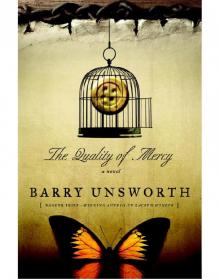 The Quality of Mercy: A Novel
The Quality of Mercy: A Novel The Songs of the Kings: A Novel
The Songs of the Kings: A Novel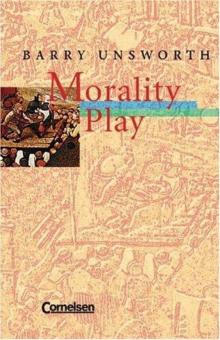 Morality Play. Mit Materialien. (Lernmaterialien)
Morality Play. Mit Materialien. (Lernmaterialien) Stone Virgin
Stone Virgin Land of Marvels
Land of Marvels Mooncranker's Gift
Mooncranker's Gift The Greeks Have a Word for It
The Greeks Have a Word for It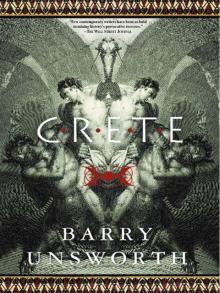 Crete
Crete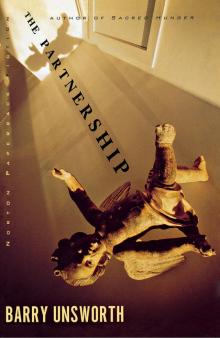 The Partnership
The Partnership The Big Day
The Big Day The Hide
The Hide Losing Nelson
Losing Nelson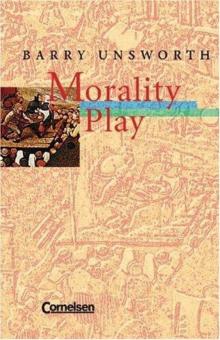 Morality Play
Morality Play Land of Marvels: A Novel
Land of Marvels: A Novel The Ruby In Her Navel
The Ruby In Her Navel